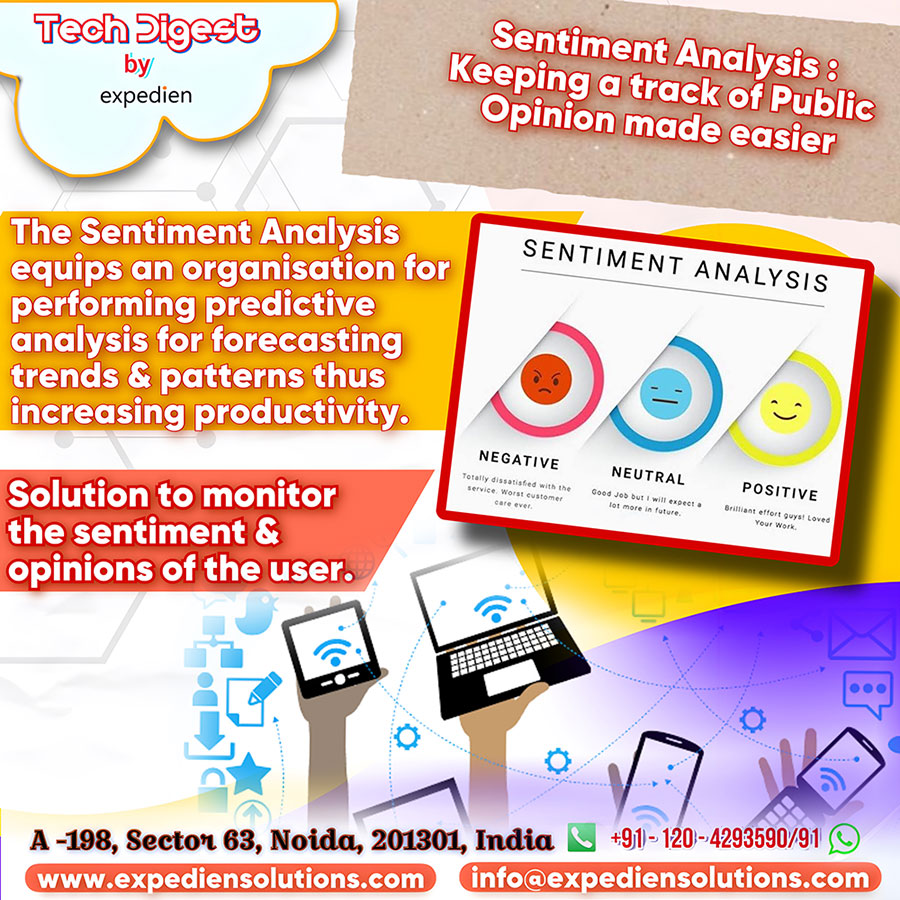- Home
- About Us
- Products
- Solutions
-

- Solutions by Industry
- Overview
-
- Solutions by Business Function
- Finance and Accounting
- Human Resource Management
- Purchase Management
- Operations Management
- Asset & Inventory Management
- Knowledge Management
- CRM - Customer Service, Call Center & Sales Automation
- Security & Surveillance
- BI and Data Warehousing
- Geo-Spatial Services & Solutions
- GIS based Turnkey Solutions
- Surveys
-
- Microsoft Dynamics Business Solution
- Overview
- Our Offerings
- Product Capabilities
- Industry Specific
-
- Services
- Clients
- Contact Us
Sentiment analysis also known as Opinion mining : Keeping a track of public opinion made easier
9 August 2023 | Expedien
It is the process of using natural language processing, text analysis and computational linguistics to identify and extract subjective information from text.
Implementing sentiment analysis in e-governance can bring several benefits:
Public Sentiment Analysis: Governments can analyse public's sentiments and opinions expressed on various platforms such as social media, emails or feedback forms. This helps in understanding public perception and satisfaction levels related to government policies, services and initiatives.
Issue Identification and Crisis Management: By monitoring sentiment in real-time, governments can quickly identify emerging issues and potential crisis. This allows them to respond proactively and address concerns before they escalate.

Policy and Decision Making: Sentiment analysis can provide insights into public's opinions about specific policies or proposals. Policymakers can use this data to make more informed decisions that align with public’s sentiment and priorities.
Service Improvement: E-governance services such as online portals or mobile apps can be enhanced based on sentiment analysis. Identifying recurring negative sentiments help in improving user experience and addressing the issues.
Performance Evaluation: Sentiment analysis can be used to evaluate the success of government programs and initiatives. Positive sentiment indicates effective implementation, while negative sentiment may highlight areas requiring attention.
Political Sentiment Analysis: Governments can use sentiment analysis to monitor political sentiment in the country. It can help gauge public reactions to political events, speeches or campaigns. This can help identify public’s needs and demands, this can also provide insights about the policies that don’t work well with the public.
Fraud Detection and Security: Sentiment analysis can be used to detect fraudulent activities or security threats by analysing sentiments in communication data.
Predictive Analysis: The sentiment analysis can provide trends and patterns that can be used for predicting the future outcomes and can forecast the public concerns beforehand.
Measuring Social Impact: Governments often undertake social programs and initiatives. Sentiment analysis can help measure their impact on the public and identify areas of improvement.
Transparency and Accountability: Implementing sentiment analysis in e-governance builds transparency as the government is more synchronised with public’s sentiment and is accountable for addressing concerns.
Public Relations and Image Management: Government sector can use sentiment analysis to monitor their image and public relations activities. This works at helping them refine their communication strategies.
Related Blogs
Stay informed
Subscribe to Expedien's Tech Digest blog


